With new technologies revolutionizing data collection, wildlife researchers are becoming increasingly able to collect data at much higher volumes than ever before. Now we are facing the challenges of putting this information to use, bringing the science of big data into the conservation arena. With the help of machine learning tools, this area holds immense potential for conservation practices. The applications range from online trafficking alerts to species-specific early warning systems to efficient movement and biodiversity monitoring and beyond.
However, the process of building effective machine learning tools depends upon large amounts of standardized training data, and conservationists currently lack an established system for standardization. How to best develop such a system and incentivize data sharing are questions at the forefront of this work. There are currently multiple AI-based conservation initiatives, including Wildlife Insights and WildBook, that are pioneering applications on this front.
This group is the perfect place to ask all your AI-related questions, no matter your skill level or previous familiarity! You'll find resources, meet other members with similar questions and experts who can answer them, and engage in exciting collaborative opportunities together.
Just getting started with AI in conservation? Check out our introduction tutorial, How Do I Train My First Machine Learning Model? with Daniel Situnayake, and our Virtual Meetup on Big Data. If you're coming from the more technical side of AI/ML, Sara Beery runs an AI for Conservation slack channel that might be of interest. Message her for an invite.
Header Image: Dr Claire Burke / @CBurkeSci

Explore the Basics: AI
Understanding the possibilities for incorporating new technology into your work can feel overwhelming. With so many tools available, so many resources to keep up with, and so many innovative projects happening around the world and in our community, it's easy to lose sight of how and why these new technologies matter, and how they can be practically applied to your projects.
Machine learning has huge potential in conservation tech, and its applications are growing every day! But the tradeoff of that potential is a big learning curve - or so it seems to those starting out with this powerful tool!
To help you explore the potential of AI (and prepare for some of our upcoming AI-themed events!), we've compiled simple, key resources, conversations, and videos to highlight the possibilities:
Three Resources for Beginners:
- Everything I know about Machine Learning and Camera Traps, Dan Morris | Resource library, camera traps, machine learning
- Using Computer Vision to Protect Endangered Species, Kasim Rafiq | Machine learning, data analysis, big cats
- Resource: WildID | WildID
Three Forum Threads for Beginners:
- I made an open-source tool to help you sort camera trap images | Petar Gyurov, Camera Traps
- Batch / Automated Cloud Processing | Chris Nicolas, Acoustic Monitoring
- Looking for help with camera trapping for Jaguars: Software for species ID and database building | Carmina Gutierrez, AI for Conservation
Three Tutorials for Beginners:
- How do I get started using machine learning for my camera traps? | Sara Beery, Tech Tutors
- How do I train my first machine learning model? | Daniel Situnayake, Tech Tutors
- Big Data in Conservation | Dave Thau, Dan Morris, Sarah Davidson, Virtual Meetups
Want to know more about AI, or have your specific machine learning questions answered by experts in the WILDLABS community? Make sure you join the conversation in our AI for Conservation group!
No showcases have been added to this group yet.
- @Palinda
- | He
Corporate Responsibility Specialist & Sustainability/ Climate Change Professional Helping Conservation, Restoration, Community Livelihood Development ESG strategy and Sustainable Development.
- 0 Resources
- 0 Discussions
- 8 Groups
Universidade Federal do Rio Grande do Norte (UFRN)
I'm a Biologist and currently a master's student. My research focuses on understanding how birds respond to a restoration experiment in a Seasonally Dry Tropical Forest exclusive to Brazil through bioacoustics.
- 0 Resources
- 0 Discussions
- 4 Groups
- @APooran
- | She/her
- 0 Resources
- 0 Discussions
- 9 Groups
- @kristian.cuervo
- | He/Him
Applied Mathematics student in Denmark, interested in applications of mathematics to ecology and nature conservation. Currently interested in developing sensors for perimeter detection in wildlife conservations in Africa.
- 0 Resources
- 4 Discussions
- 9 Groups
- @MorganeLabadie
- | She/Her
I'm an ecology researcher with extensive experience of fieldwork and project management in international contexts. I specialise in wildlife, zoonotic diseases, data collection and analysis using mainly non-invasive techniques (acoustic, camera traps, etc.) and invasive techniques
- 0 Resources
- 0 Discussions
- 4 Groups
- @Jen_NZ
- | she/her
- 0 Resources
- 3 Discussions
- 7 Groups
- @cappel
- | she/her
Wildlife Science PhD candidate working on computer vision with camera traps and bioacoustics
- 0 Resources
- 5 Discussions
- 13 Groups
- @valengsb
- | she / her
GIS specialist for Audubon Americas | Biologist with an emphasis on Conservation and Sustainable Development | Innovative approaches in the study and monitoring of biodiversity for possible, biodiverse, and just futures.
- 0 Resources
- 0 Discussions
- 18 Groups
Ecologist at Noe NGO, Project manager in restauration, rewilding, and citizen sciences program for grassland ecosystems and wild pollinators

- 0 Resources
- 1 Discussions
- 7 Groups
- @capreolus
- | he/him
Capreolus e.U.
wildlife biologist with capreolus.at


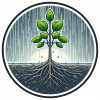


- 1 Resources
- 78 Discussions
- 16 Groups
- @JakobWiren
- | He,him
Swedish soon-to-be graduate engineer in AI/ML and robotics. Writing my master thesis in using decision trees for anti-poaching in Limpopo, South Africa. Am passionate about conservation, AI and travelling. Help me find a way to help you!
- 0 Resources
- 1 Discussions
- 13 Groups
- @fshort
- | He / Him
Boston University PhD Candidate, Biological Anthropology. Engaging in passive acoustic monitoring (PAM) of Bornean orangutans (Pongo pygmaeus wurmbii), Bornean white-bearded gibbons (Hylobates albibarbis), and red leaf monkeys (Presbytis rubicunda)
- 0 Resources
- 2 Discussions
- 2 Groups
In a first, UMass Amherst, Cornell use AI to mine big migration data on massive scale
9 October 2019
Rutgers University, Microsoft AI for Earth, Google Earth Outreach and San Diego Zoo Global are proud to announce the world’s first camera trap technology symposium, to take place November 7th and 8th at Google...
2 September 2019
Sharing failure, tech support for conservation, roaming mentors, conservation tech hype cycles and developing new road maps - participants in our tech workshops at ICCB 2019 shared an abundance of ideas for how to shape...
21 August 2019
In this case study, Cooper Oelrichs of Save Indonesian Endangered Species Fund (SIES) breaks down his proposal for the development and training of an automated rhino identification system from limited camera trap data.
27 July 2019
The WILDLABS TECH HUB is supporting technology solutions tackling the illegal wildlife trade, in collaboration with the Foreign & Commonwealth Office, Digital Catapult, Satellite Applications Catapult, Amazon Web...
4 June 2019
To further their missions, LDF and Microsoft are collaborating on the AI for Earth innovation grant to support applicants in creating and deploying open source machine learning models, algorithms, and data sets that...
4 June 2019
Traditionally, illegal wildlife trade thrived in physical markets. But today it has also moved online. In China, more than half of the trade in elephant ivory items happens on e-commerce platforms. Enrico Di Minin and...
31 May 2019
This webinar recording will provide a brief overview of current SMART functionality, highlight case studies of large scale and innovative SMART deployments, and detail how SMART is embracing and leveraging new...
21 May 2019
In February, we released an open call for the WILDLABS TECH HUB, offering 3 months of support for solutions using technolgy to tackle the illegal wildlife trade. We were overwhelmed by an incredible 37 submissions,...
13 May 2019
To realise the potential benefits of data for our societies and economies we need trustworthy data stewardship. We need to establish different approaches to deciding who should have access to data, for what purposes and...
15 April 2019
Happy World Wildlife Day! To celebrate, this week we've asked our community to share photos showing how they are using tech in the field or the lab, using the #Tech4Wildlife hashtag.
3 March 2019
After a promising first run in Namibia, a Swiss project could aid savanna conservation using drones and automatic image analysis.
18 February 2019
August 2025
event
September 2025
event
event
event
event
October 2025
event
event
event
December 2025
event
March 2026
November 2023
event
17 Products
Recently updated products
| Description | Activity | Replies | Groups | Updated |
|---|---|---|---|---|
| Hi Ellie, thanks for your interest. So I have two possible explanations why the camera traps I used did not release, even though I found otter droppings directly in front of my... |
|
AI for Conservation, Animal Movement | 4 years 11 months ago | |
| Samara P. El-Haddad Wildlife Conservation Junior Specialist at Lebanon Reforestation Initiative (LRI)... |
|
AI for Conservation, Community Base | 5 years ago | |
| How neat, thanks for sharing! We'd love to hear more about your drone project once it's underway, please keep us updated on that one! |
|
AI for Conservation, Emerging Tech | 5 years 1 month ago | |
| Great talk! I thoroughly enjoyed it. Some high schoolers have done small AI projects(s) and have interest in the wildlife. What resources would you all suggest to further... |
|
AI for Conservation, Camera Traps | 5 years 1 month ago | |
| Author: Jody Tucker, U.S. Forest Service, Pacific Southwest Region Carnivore Monitoring ProgramFigures below text in order (Fig 1... |
|
AI for Conservation, Emerging Tech | 5 years 1 month ago | |
| What better way to celebrate Endangered Species Day 2020 than try a new technology to protect them? If you're planning to be out and... |
|
AI for Conservation, Emerging Tech | 5 years 3 months ago | |
| DeepForest docs are here. https://deepforest.readthedocs.io/ Welcome to have a look. My experience is that individual trees cannot be distinguished in satellite... |
|
AI for Conservation | 5 years 4 months ago | |
| Steph, thank you so much for this, this is wonderful :) Really, really apreciate you sharing this with me :) Diving into all of the wonderful resources from you, thank you so very... |
|
AI for Conservation | 5 years 4 months ago | |
| A call put out over on Twitter by Jesse Alston might be of interest here - both for conservationists and grad students. Looks like... |
|
AI for Conservation | 5 years 4 months ago | |
| This can be done, happy to help :) But I think I need to understand the situation a little bit more. Do you already have the data for training / inference? Do you have any... |
|
AI for Conservation | 5 years 4 months ago | |
| Hi there this post on Conservation X labs recently came up on designing softwarre for individual horse recognition: https://... |
|
AI for Conservation | 5 years 5 months ago | |
| Wildlife Insights launched their online platform hosting over 4 million camera trap images. They use AI to automatically classify the... |
|
AI for Conservation | 5 years 8 months ago |
Enter the Zooniverse: Try Citizen Science for Yourself!
18 March 2020 12:00am
Tutorial: Train a TinyML Model That Can Recognize Sounds Using Only 23 kB of RAM
16 March 2020 12:00am
Accepting Applications: ArcGIS Solutions for Protected Area Management
4 March 2020 12:00am
Call for Nominations: Tusk Conservation Awards
3 March 2020 12:00am
Competition: Plastic Data Challenge
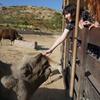 Ellie Warren
Ellie Warren
3 March 2020 12:00am
Hawai'i Conservation Conference
 Hawaiʻi Conservation Alliance
Hawaiʻi Conservation Alliance
28 February 2020 12:00am
Competition: The Artisanal Mining Grand Challenge
26 February 2020 12:00am
Listening to Nature: The Emerging Field of Bioacoustics
24 February 2020 12:00am
Team for Building of ML app for horse identification and conservation
20 February 2020 11:09pm
HWC Tech Challenge Update: Thermal Elephant Alert System
17 February 2020 12:00am
ICEI2020: 11th International Conference on Ecological Informatics
 ICEI 2020
ICEI 2020
14 February 2020 12:00am
Seafood fund seeks ideas for innovation projects up to £250k
11 February 2020 12:00am
WILDLABS Virtual Meetup Recording: Acoustic Monitoring
5 February 2020 12:00am
AI for camera trap public data
17 December 2019 9:20pm
A New Cloud Platform Unveils the Most Diverse Camera Trap Database in the World
17 December 2019 12:00am
[ARCHIVED] Workshop on Deep Learning Methods and Appliocations for Animal Re-Identification
25 November 2019 6:24pm
WACV2020 AI for Animal Re-ID: Deep Learning Methods and Applications for Animal Re-Identification
25 November 2019 12:00am
WILDLABS Virtual Meetup Recording: Drones
9 November 2019 12:00am
Camera Trapping: Incredibly Useful Resources List
5 November 2019 12:00am
Who wants to learn Python? Courses to get you started coding
2 May 2016 3:13pm
1 March 2019 9:20am
Hello everyone what are you wating for..
All US, UK, India users can enroll courses from Intellipaat (the largest IT trainng company)
check some of thier superb training list:
29 October 2019 4:52pm
Chuck's Python for Everyone course is available these days at www.py4e.com, and he's also created a course called Web Apps for Everyone www.wa4e.com. Both excellent resources, and he's a strong proponent for (and creator of) open source educational tools in general.
Lucy
Plant-Powered Camera Trap Breakthrough
15 October 2019 12:00am
Using Artificial Intelligence to Track Birds’ Dark-of-Night Migrations
9 October 2019 12:00am
Camera Trap Technology Symposium (Recordings): Bringing Developers and Users Together
2 September 2019 12:00am
ICCB 2019: 5 Key Discussions about the Future of Conservation Tech
21 August 2019 12:00am
Conservation biologists find new applications for AI tools
5 August 2019 2:57pm
Automated Identification of Indonesian Rhinos
27 July 2019 12:00am
[ARCHIVED] Position: UI/UX Machine Learning Engineer
8 July 2019 11:27pm
[ARCHIVED] Position: Senior Computer Vision Research Engineer
8 July 2019 10:42pm
Hello buzzing World!
7 July 2019 6:55pm
ML at the Edge
28 June 2019 8:16am








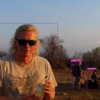

















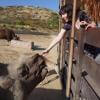





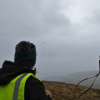








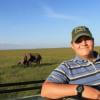




31 August 2017 9:06am
A couple of years ago I completed the Coursera course Programming for Everybody (Getting Started with Python) with Charles Severance. I found it really well paced and well taught. He's a very personable tutor, and has also written a free book Python for Everybody, available as a PDF.
I found the Coursera course on R Programming with Roger Peng to be more difficult to follow, but I'm not sure whether that was down to the teaching style or the language itself. For R, I'd definitely recommend the best place to get started is swirl - Learn R, in R!
Happy coding